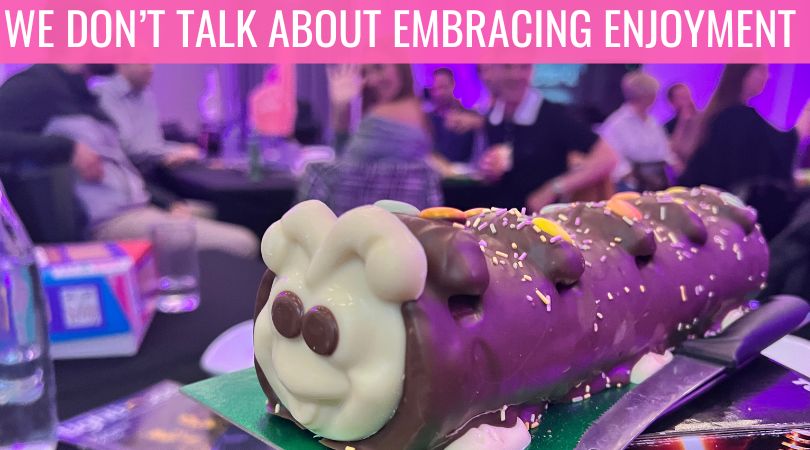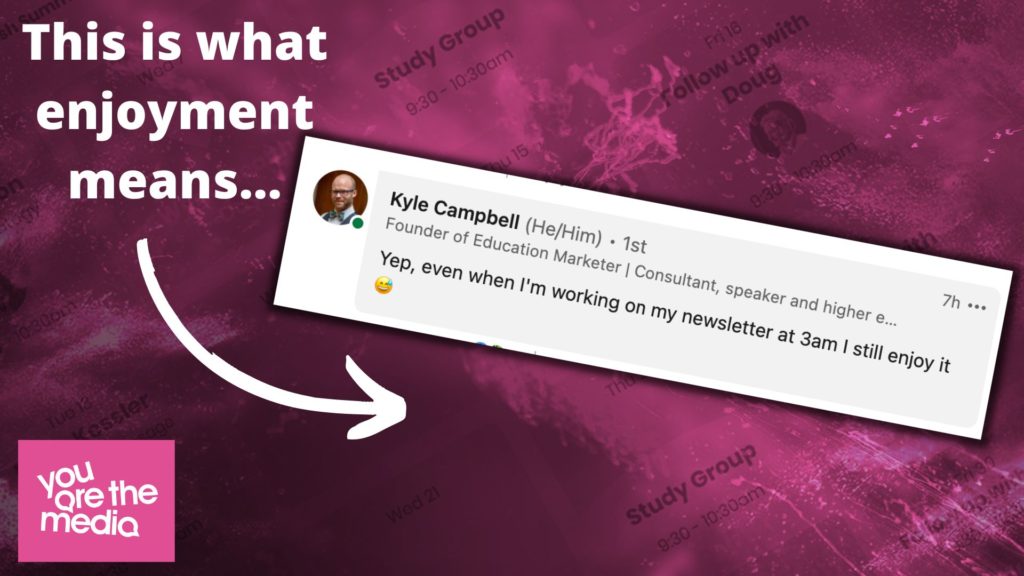Embracing Enjoyment Is Something We Don’t Talk About

Finding enjoyment from the work you produce is a valuable skill.
Most of the time though, we’re focused on the outputs, the goals and the results.
What if you found more of what you liked, balanced with the work that needs to be done with less of what you don’t like?
Let’s Define
Enjoyment is something you find where you go at your own pace. It’s got nothing to do with following your passion, it’s got nothing to do with setting yourself big objectives or a deadline to hit.
It’s about noticing when you’re happy and you keep going. You choose.
Whether it’s keeping going from the seed of curiosity that sparked your interest (that others can get onboard), or a skillset you’re discovering from presenting in front of a camera to confidence in writing, it matters. When you create, share and build, you become great at something you enjoy doing.
It’s this…

Let’s just put a caveat in the way. Enjoyment is not about telling people how much fun you are having. It’s what you do where you don’t have to tell everyone.
We’re Too Busy Looking At The Results
Enjoyment comes from the path you progress. You do it not just for the audience you can grow, the attention you gain, the knowledge you’ll share, the proof to what you do, the success you want to share, or the life you live that you want to tell people. You do it where you shift from the obsession with the end, to being in the moment.
You steer away from having to demonstrate your worthiness. That’s bad for happiness. Having an act is only giving to leave you exhausted.
It makes sense to replace the dopamine hits of seeing the number of likes gained but work on serotonin and your enjoyment of doing the work.
Ways It Can Work For You
Nearly 10 years ago, I started my newsletter. It has been a constant in my life, but it’s still something I genuinely enjoy.
It’s been the habit that has always been there when I’ve been ill, when I’ve felt low or when I have felt less energetic.
Here’s where to find enjoyment when you have complete control over the medium and the message you share.
➡︎ You shape ideas. The reason my newsletter works today is through having an appetite to keep going and be open to change. The longer you are involved, the more enjoyment you get. For instance, I enjoy reading the recommendations from the people who start the newsletter each week (called the YATM Takeover)
➡︎ Knowing people are there. When you start it’s difficult as you might not be sure of the people who are there. Over time and as subscribers join, you reach out and find a glimpse of their world. When you know the people you are creating for, it becomes satisfying
➡︎ It helps to carve your own space. Through enjoying the work and knowing the role you serve, it elevates what you do. In the words of David Perell you build a ‘personal monopoly.’ This is, ‘your unique intersection of skills, interests, and personality traits where you can be known as the best thinker on a topic and open yourself up to the serendipity that makes writing online so special.’
➡︎ Enjoyment comes from choice not what your industry expects from you. This is about knowing that the purpose of your work is intentional and there to help others. That feels good. It means you can start to share ideas, more easily, but at the same time, you choose the role you play, not what your industry has done for generations.
➡︎ The conversations that occur feel good. I have been in meetings where someone has referenced a previous article or it could even be a point that someone picks up on email. This connection with the source (the newsletter) gives me joy and why I keep going. It starts dialogues and becomes icebreakers.
➡︎ It helps you wander. For every single subject matter that I share with you, I’ll look to bring in evidence from my own world or how something worked (or failed). There is enjoyment in having a central theme and then building around it from experience and finding the flow. Research (2022) from the Journal of Experimental Psychology championed how engaging thinking can be but it can also be difficult to appreciate. ‘That could explain why people prefer keeping themselves busy with devices and other distractions, rather than taking a moment for reflection and imagination in daily life.”
➡︎ Having familiarity encourages contentment. For me, having a newsletter to come back to, each week, makes me feel at home. Even when the world was in a strange place at the beginning of Covid and we all lived indoors, having a routine that still happened in good times and bad makes everything feel settled.
These results of enjoyment from the work you produce is not for the promise of a short-term addictive hit, but long-term generosity. It’s making, giving and keeping the cycle continuous.
Questions To Ask
You can be good at a lot of things, but great at something you genuinely enjoy.
Here is an example. One thing that was hampering my enjoyment was delivering a podcast. The YATM Podcast ran from 2018 to 2020 and had segments and interviews with others. It was a great production and around 400 listens per show. However, when you chat to people you are not too familiar with (for the interviews), I felt that the connection wasn’t there. That’s what I mean by being good, but not great as the fulfilment wasn’t there.
Here are some questions to ask:
➡︎ Can you write down 1) what you enjoy doing 2) what needs to be done and 3) do you need to do it. As an example, I 1) enjoy creating the YATM newsletter, 2) I have consultancy work and 3) I used to record the weekly articles as audio and then uploaded to Spotify/iTunes, I stopped it as took far longer than needed and listening stats were below 100 per article.
➡︎ If you are working on audio, visual, text, ask yourself, ‘am I enjoying this?’ Sometimes when work starts to feel like a chore that is reflected at the audience. This could be a topic area that can be easily found elsewhere or just lacks your own stamp of thought.
➡︎ Can you exceed the effort of what is initially asked of you? By this, I mean doing more than what you originally intended. When you start, you recognise that you have to put a lot more time in than anticipated. It’s not about burning out, but wanting to sharpen skills or just be a better creator.
➡︎ Can you live with the itch, as that becomes part of the enjoyment? This is about knowing that you are going to keep going and understand that curiosity plays a huge role when it comes to joy. It means you will never get to a finish point, but that was never part of your plan!
The emphasis on enjoyment is not something that people talk about much. Josh Spector and I discussed this on Josh’ excellent, I Want To Know podcast. Here are five minutes on enjoyment as an underrated skill for creative entrepreneurs.
Let’s Round-Up
Doing something you enjoy, amplifies your entire efforts.
Enjoyment is from the craft you learn, the skills you develop and the freedom you start to nurture. It comes with time, but what happens is that this is held up for others to see. It feels far easier for someone to commit when they can see the joy, effort and playfulness, that they perhaps aren’t seeing elsewhere.
Enjoyment means nothing feels forced. It still has a commercial approach to your work, but nothing feels better than stepping up and creating with an immense sense of contentment. This is what helps form a habit that you cannot break.



